Be glad you're not living in one of those terrible high-tax countries
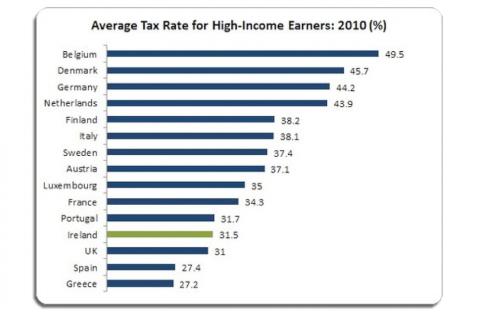
Is higher taxation a bar to high investment levels? Obviously not - otherwise Ireland would be a league leader. By Michael Taft.
The Government seems to have done a U-turn on the issue of tax exiles. Despite the Programme for Government’s commitment on the issue, the Sunday Business Post reports that following an avalanche of submissions from the likes of the American Chamber of Commerce, etc. the Minister for Finance looks to do nothing. Why? Because it would undermine investment.
Minister Brian Hayes was also at it – claiming that tax increases were effectively over. Minister Lucinda Creighton backed up her party colleague. And Minister Richard Bruton also warned against further tax increases on high-income groups; again, because of that ol’ investment problem.
Do we see a pattern? If we increase taxes on high-income groups or the business sector we will lose out on investment. How valid is this argument?
Let’s bottom-line this: if maintaining a low-tax regime, whether on high-income earners or the business sector, is the key to ensuring high levels of investment in the economy, then that policy has already been judged to be an utter and absolute failure.
Okay, now let’s work through some arguments.
First, Irish high-income earners pay a lower tax rate than equivalent earners in most other EU-15 countries. The following is from the OECD Tax and Benefits Calculator, using a two-income household example where one person is earning twice the average wage and another person earns 1.67 the average wage. In Ireland, this equals €118,750.
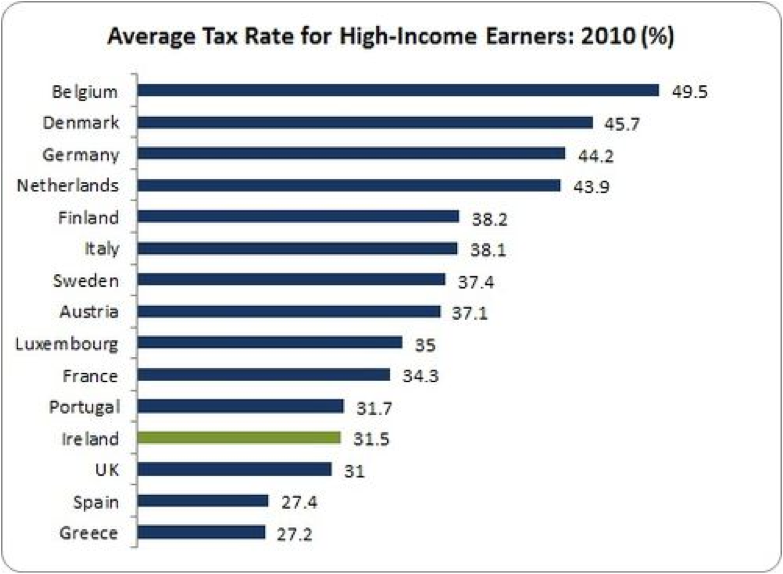 As seen, Irish high-income earners are taxed at relatively low-rates. We’re right down there with other peripheral countries (with the exception of Italy) and low-tax, high-poverty UK. There have been tax increases since 2010. The current rate is 33.7% but we don’t know to what extent other countries have increased taxes. We should also note that the above doesn’t include local taxation (property taxes, service charges, etc.), which are higher in a number of other countries. Nor does it include tax breaks (these are just headline figures).
As seen, Irish high-income earners are taxed at relatively low-rates. We’re right down there with other peripheral countries (with the exception of Italy) and low-tax, high-poverty UK. There have been tax increases since 2010. The current rate is 33.7% but we don’t know to what extent other countries have increased taxes. We should also note that the above doesn’t include local taxation (property taxes, service charges, etc.), which are higher in a number of other countries. Nor does it include tax breaks (these are just headline figures).
In effect, in 2010 two-income earners would have to pay over €6,000 more a year to reach the average of other EU-15 countries; they would have had to pay nearly €12,000 more to reach the average of other small open economies; and they would have had to pay over €15,000 more to reach German levels.
Second, Irish corporate tax rates are ultra-low compared to other EU-15 countries.
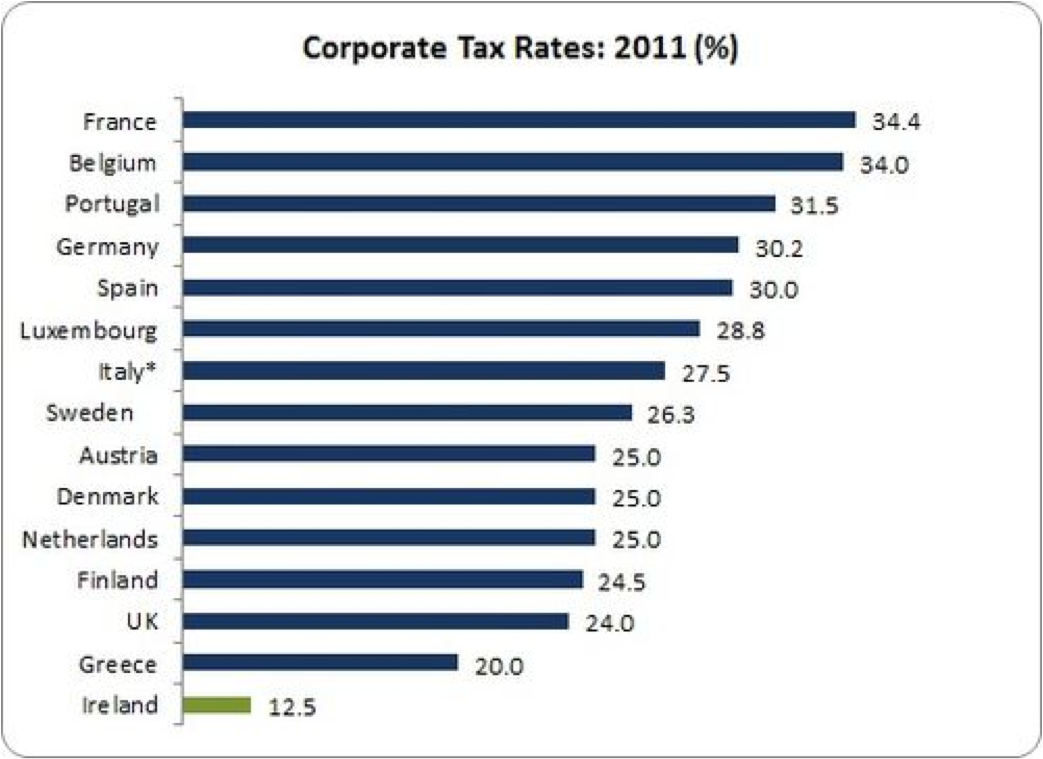 Of course, these are headline rates. Effective tax rates in other countries (after tax breaks, allowances, etc.) would be lower than the rates above. But so would it be in Ireland – especially given that Google’s tax rate (as a percentage of gross profits) was less than 1%.
Of course, these are headline rates. Effective tax rates in other countries (after tax breaks, allowances, etc.) would be lower than the rates above. But so would it be in Ireland – especially given that Google’s tax rate (as a percentage of gross profits) was less than 1%.
Third, employers’ social insurance (i.e. PRSI) in Ireland is even lower relative to other EU-15 countries. We are ultra-ultra-low.
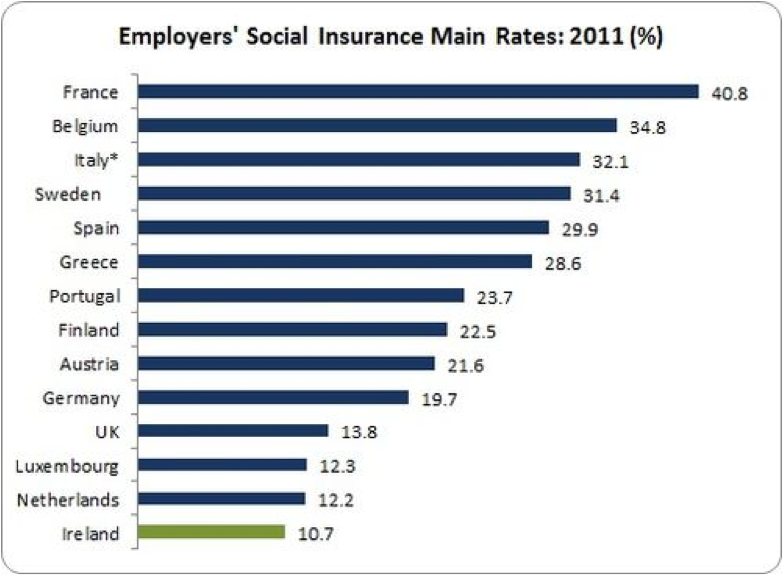 Yes, there we are again – at the bottom.
Yes, there we are again – at the bottom.
So what do we have?
All those other countries are doing what we have been warned against: higher tax rates on high-income earners and business. This is the type of thing that would devastate economies according to Fine Gael. Obviously, investment must be flooding out of those countries. In fact, with such high tax/insurance rates, they must be facing into an investment crisis.
So what level of investment does the IMF project for these countries by 2017?
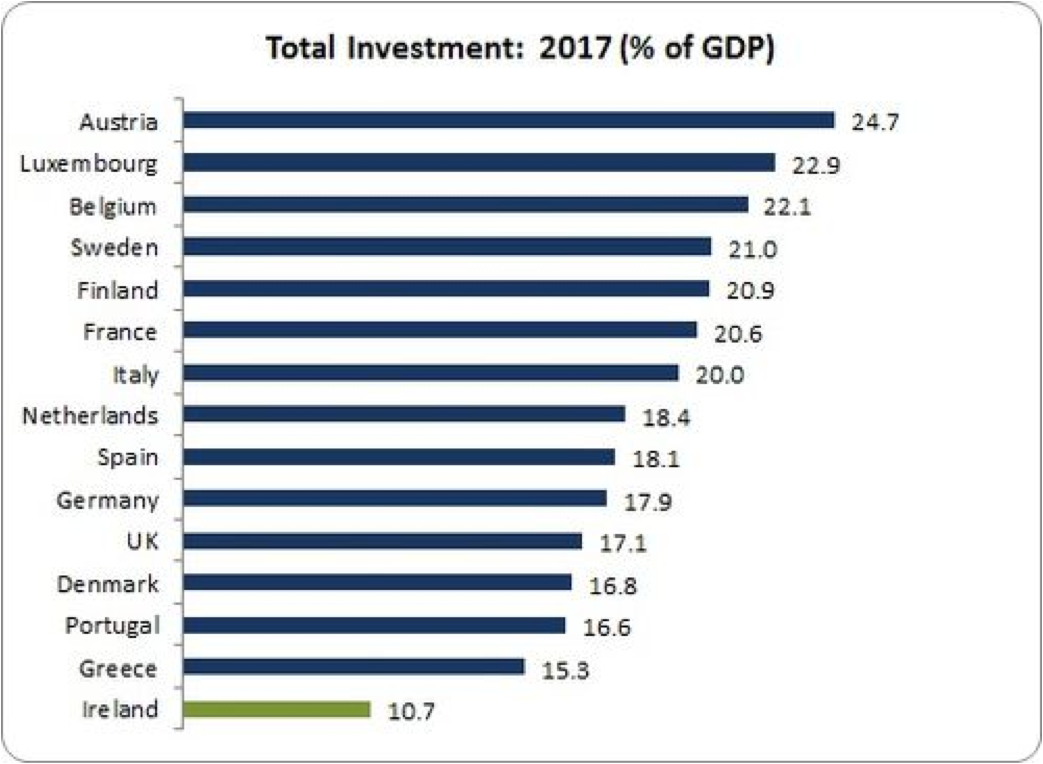 Wow. Ireland has followed the Fine Gael prescription for higher investment and what do we find? Ireland will have the lowest level of investment in the EU-15. The average investment rate in other EU-15 countries will be 19.5% in 2017; the Irish rate will be almost half. All those countries with higher tax rates on profits, income and payroll – they will have twice the level of investment.
Wow. Ireland has followed the Fine Gael prescription for higher investment and what do we find? Ireland will have the lowest level of investment in the EU-15. The average investment rate in other EU-15 countries will be 19.5% in 2017; the Irish rate will be almost half. All those countries with higher tax rates on profits, income and payroll – they will have twice the level of investment.
In short, low-tax Ireland is facing into an investment crisis.
So is higher taxation a bar to high investment levels? Obviously not; otherwise Ireland would be a league leader. In fact, higher taxation can induce higher levels of investment – through higher public investment, public consumption and progressive social transfers. That is what we are seeing in other countries.
In Fine Gael’s Ireland, however, we must not scare the high-income and corporate horses with talk of higher taxation. Otherwise, they won’t invest.
But as we see, they’re not investing anyway. Beyond the insipid tax debate lays a more fundamental question: What is wrong with our economic model?
That is one of the key questions for 2013.
